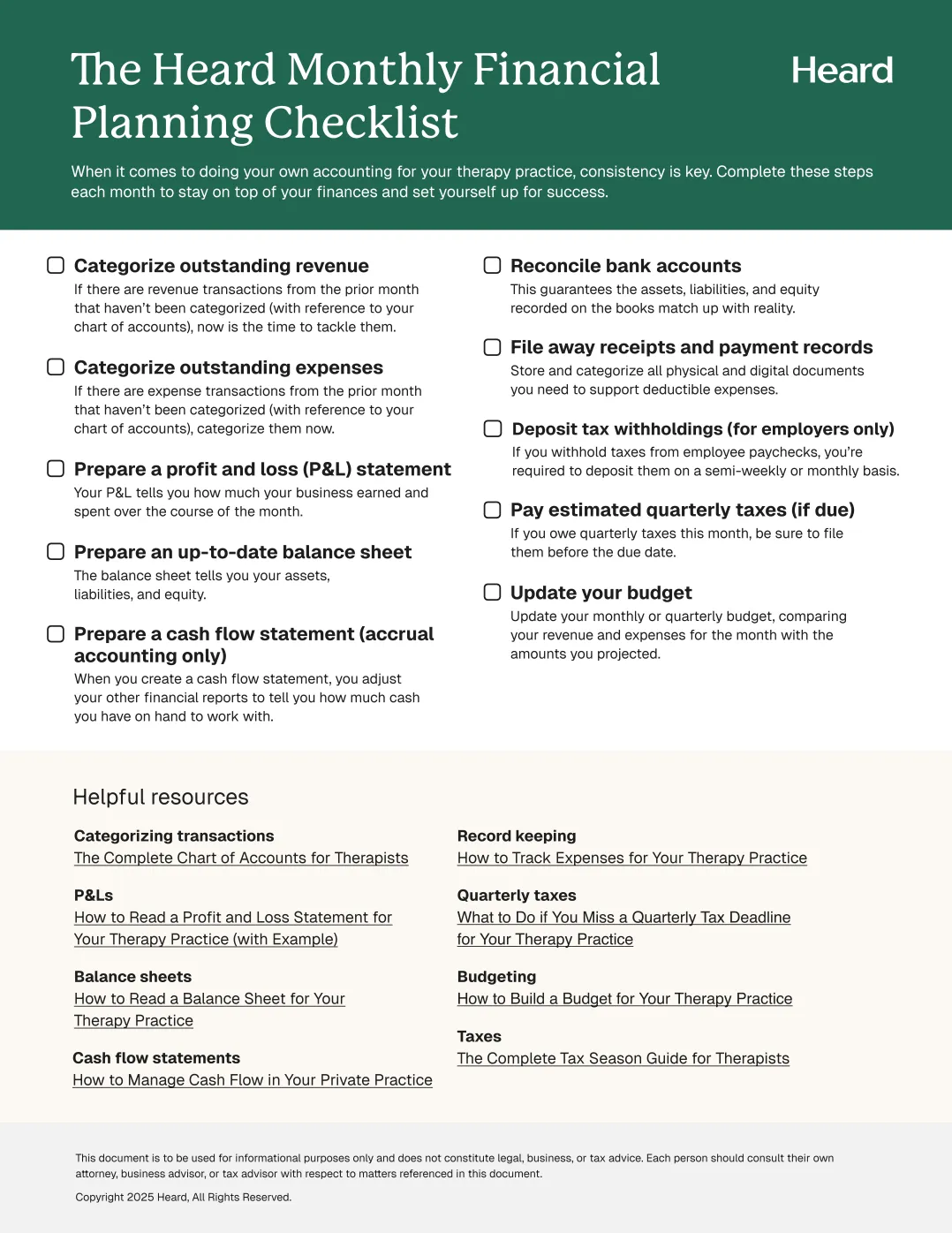Bookkeepers and accountants play different but mutually supportive roles helping your therapy practice thrive.
A bookkeeper takes care of day-to-day tasks your business needs done in order to keep records and stay financially organized. An accountant uses information your bookkeeper provides to get a “big picture” view, provide guidance, and help you file your taxes.
Once you take a deeper dive into the tasks bookkeepers and accountants handle, the qualifications for each role, and how the two work together, you’ll have a better idea of what your therapy practice needs most.
{{resource}}
What does a bookkeeper do?
A bookkeeper keeps your financial records current.
Every time money enters or leaves your business, the transaction is recorded in a document called your general ledger—the “book” in “bookkeeper.” Your bookkeeper “keeps” it up to date and accurate.
In order to do so, your bookkeeper must:
- Track your transactions. Most bookkeepers use software (like Heard) that automatically imports transactions from your business bank and credit accounts, and allows them to be entered in the general ledger.
- Maintain a chart of accounts for your business. The chart of accounts is a list of categories into which different transactions are sorted.
- Categorize income and expenses. Every transaction is categorized, so you or your accountant can look at the general ledger and immediately see how you’re earning money and how you’re spending it.
- Reconcile bank statements. This monthly task ensures your books accurately reflect the state of your bank accounts, and vice versa.
These are the essentials. On top of day-to-day tasks, your bookkeeper may also:
- Generate financial reports. Profit and loss statements (P&Ls), cash flow statements, and your balance sheet summarize information recorded in the general ledger, letting you see the current state of your finances and track performance over particular periods.
- Handle accounts receivable and accounts payable. Your bookkeeper may invoice clients and ensure bills get paid (accounts receivable), as well as take care of paying any contractors your practice may hire.
- Manage payroll, tracking any employees’ work hours (if necessary) and making sure they get paid.
Bookkeeper qualifications
There are no qualifications an individual needs to meet in order to go into business as a bookkeeper.
However, two organizations offer certifications for bookkeepers:
- The National Association of Certified Public Bookkeepers (NACPB). Bookkeepers certified through the NACPB append CPB to their names.
- The American Institute of Public Bookkeepers (AIPB). Bookkeepers certified through AIPB append CB to their names.
Regardless of certifications or memberships, any bookkeeper you hire should be able to provide you with a list of references, so you can check their reputation with past or current clients.
The cost of hiring a bookkeeper
Bookkeepers’ rates vary according to their level of experience, their location, and any specializations (e.g. specific industries they have experienced with).
Some bookkeepers may charge a flat monthly rate to do your bookkeeping for you. Others charge by the hour.
The amount of work a bookkeeper needs to do depends on the number of transactions your practice carries out over the course of the month. The more transactions, the higher the cost of hiring a bookkeeper.
Also, if you’re behind on your bookkeeping and you need to get caught up, expect to pay extra. Retroactive or historical bookkeeping is either negotiated as one lump sum, or charged according to how many months of catch-up you need done.
Heard charges one flat rate, regardless of how many transactions your practice has.
{{resource}}
What does an accountant do?
Bookkeepers focus on the details: Day-to-day financial transactions and monthly financial reporting.
Accountants take a broader view, assessing how your business performs over time and helping you plan for the future. To do so, they use information prepared by your bookkeeper—namely, financial reports and transactions recorded in your general ledger.
An accountant can:
- Prepare your tax return and file it for you. For many small business owners, the only time they talk to their accountant is during tax season, when it’s time to file.
- Provide guidance and advice. Your accountant can help you find ways to save money on taxes—for instance, by identifying deductible expenses. They can also help you make major business decisions, like deciding when to incorporate your practice.
- Plan for the future. With the help of an accountant, you can build financial projections, create a budget, and reduce some of the uncertainty that comes with running your own practice.
- Help you apply for business loans and lines of credit. If you’re planning to borrow money, your accountant can advise you on interest rates and repayment terms, and help you answer questions from potential lenders.
On top of this, an accountant may also handle regular bookkeeping tasks for you. Many accounting firms offer a wide range of services, from monthly bookkeeping to tax prep and long-term planning. Having your bookkeeping and accounting handled under one roof may simplify your finances.
That being said, if you’re working with smaller firms or individual accountants, you may find it costs more to have your accountant take care of bookkeeping tasks than it would if you hired a separate bookkeeper; accountants typically charge higher hourly rates than bookkeepers, regardless of the tasks they’re doing.
Accountant qualifications
When hiring an accountant, look for a Certified Public Accountant (CPA). A CPA has been certified by the Board of Accountancy for your state, and met requirements for education, experience, and a code of ethics.
The cost of hiring an accountant
How much you pay for an accountant depends upon the needs of your business.
For instance, a sole proprietor with a non-itemized tax return could expect to pay something like $279 to have their taxes filed, while an itemized tax return for the same sole proprietor would cost $392 (on average). As soon as that sole proprietor incorporates, their annual tax return starts costing closer to $1,000.
You can find a full breakdown of average accounting fees in the 2023 NSA income and fees survey.
{{resource}}
Should you hire a bookkeeper or an accountant?
Whether you decide to hire a bookkeeper or an accountant depends on two factors:
- How much time it costs you to do your own bookkeeping and accounting
- How many errors you make doing your own bookkeeping and accounting
If it takes you half an hour per week to make sure your books are well organized, and it’s a breeze filing your own taxes, then you may not need help from professionals.
This is most likely the case if your practice is small, you have very few deductible expenses, and you’re dealing with a small number of clients. The more complex your practice becomes, however, the more time you’ll spend on bookkeeping and accounting.
Complexity also creates more opportunity for error. If you find that, often…
- Your bank statements and your business books disagree
- You lose track of bills or payments from clients
- You make mistakes when you file your taxes
- Bookkeeping and accounting tasks cut into your personal or family time, or
- You feel anxious when you think about your bookkeeping and taxes,
It’s likely time to talk to professionals who can help you with the financial side of your business.
When you sign up for Heard, all of your bookkeeping and accounting tasks are handled by financial professionals specializing in therapy practices.
—
One of the biggest benefits of working with a bookkeeper or accountant is being able to track and correctly itemize deductible business expenses. That can significantly reduce your tax burden.
If you don’t have a professional helping you, our complete list of tax deductions for therapists will get you started.
This post is to be used for informational purposes only and does not constitute legal, business, or tax advice. Each person should consult his or her own attorney, business advisor, or tax advisor with respect to matters referenced in this post.
Bryce Warnes is a West Coast writer specializing in small business finances.
{{cta}}
Manage your bookkeeping, taxes, and payroll—all in one place.

Discover more. Get our newsletter.
Get free articles, guides, and tools developed by our experts to help you understand and manage your private practice finances.
When you join Heard, you’ll be supported by a team of bookkeepers and accountants who specialize in therapy practices. Schedule a free consult to learn more.
Schedule a free consult
.webp)



